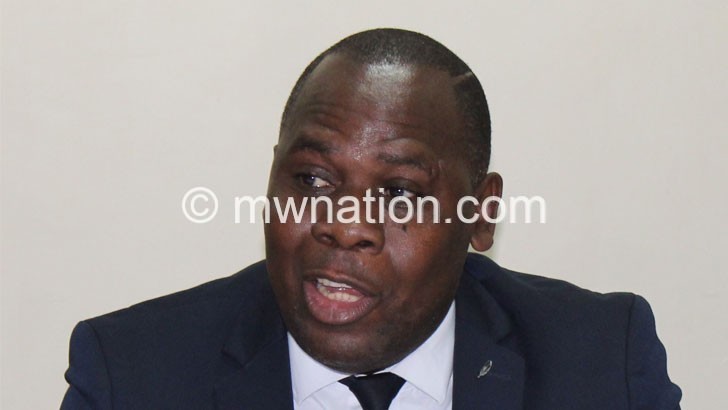Tonse slow, lost Direction—HRDC
The Human Rights Defenders Coalition (HRDC) has faulted the Tonse Alliance administration led by President Lazarus Chakwera for alleged slowness and lack of direction eight months after promising Malawians a better country.
In an interview to reflect on the landmark February 3 2020 High Court of Malawi sitting as the Constitutional Court judgement, which nullified the May 21 2019 Presidential Election and ordered a fresh election which Tonse won, HRDC chairperson Gift Trapence said the pace of the Chakwera administration in implement ing its colourful campaign promises does not inspire confidence among Malawians.
But Minister of Information Gospel Kazako, who is the official government spokesperson, said in a separate interview yesterday that Malawians are aware that changing the course of the country requires patience. He said speed has the potential to plunge the country into another sad situation that may not improve people’s welfare.

Trapence, whose organisation led a series of protests against the 2019 presidential election which at times turned nasty, said the struggle for electoral justice was meant to create a better Malawi.
He said the new government, which campaigned on the platform of change and a better Malawi, is not delivering to the expectation of the citizenry.
Said Trapence: “To begin with, this government had the greatest support and will of Malawians because citizens wanted to see a new Malawi. But today, Malawians have completely lost hope in this Tonse government because of the broken promises.
“This is the reality on the ground whether you like it or not. Most Malawians, including Tonse Alliance political party partners and followers, are frustrated with the slowness and lack of clear direction of this government.”
He said the HRDC is disappointed with the fight against corruption which he said is more of lip service as there is no clear progress on reported and commenced cases.
Trapence, whose grouping is running a corruption whistle-blower initiative, said while the Anti-Corruption Bureau (ACB) is expected to be independent, its failure to act with speed is a reflection of lack of sufficient political will.
He said demanding accountability or pushing the ACB to work extra harder is not an act of interference. He said the Tonse Alliance promised to deal with corruption; hence, cannot afford to sit back and watch while the ACB is doing little for fear of the alleged interference.
Trapence said: “Malawians hopes and expectations are doomed if things will remain the same. We need the President to be in control of the country’s affairs.
“We need him to be action-oriented. This is the right time to release the [President’s] Cabinet assessment to Malawians. This is the right time to manage those individuals who think they are more powerful than the President.”
But in a written response, Kazako said the new administration is operating within the dictates of the law. He said the speed advocated by HRDC is what saw Malawi become a lawless State.
“Speed must not compromise compliance to the law and defilement of set functional systems. Speed is a positive thing, but this sort of speed advocated by HRDC is the one that saw Malawi becoming almost a lawless State with no respect of systems, values and ethics. We believe the HRDC has abundant capacity to appreciate this aspect,” the minister said.
While the court heard the election nullification petition by Chakwera of Malawi Congress Party (MCP) and UTM Party president Saulos Chilima, who later partnered in the court-sanctioned election held on June 23 2020, HRDC organised mass protests nationwide demanding electoral justice.
Both Chilima and Chakwera, who were first and second petitioners, participated in the demonstrations.
In a national address two weeks ago, the President urged Malawians not to be obsessed with campaign promises amid the deadly coronavirus pandemic.
But lawyer and governance commentator Justin Dzonzi yesterday said the President is duty-bound to honour the promises he made during the campaign and that Malawians have a legitimate right to remind him of the same with or without Covid-19.
He observed that the frustration among some Malawians stems from their expectations of instant change.
Said Dzonzi: “The biggest challenge for all regimes after 1994 is to deliver economic goods. When Malawians are voting for a party or someone in power their expectation is that theIr economic livelihood will improve. Some expect jobs to come, businesspeople expect loans.
“Since 2019, Malawians have gone through difficult economic times and for me I think what is crucial is for government to deliver these economic goods as soon as possible, otherwise it appears that those that have been appointed in positions of power are so far the only beneficiaries of what you call the struggle and the Constitutional Court ruling.”
On his part University of Malawi Chancellor College political scientist Blessings Chinsinga agreed that the disconnection between what people expected and what government is doing was the cause of the frustration.
He said government should come out boldly and make serious policy statements that will help Malawians see a difference between the past and the promised Malawi.
In December 2020, HRDC also gave the Tonse Alliance a mixed scorecard with successes on governance and keeping promises, but noted discontent among Malawians in other areas, including Affordable Inputs Programme—the administration’s flagship campaign promise that has seen 4.2 million smallholder farmers buying fertiliser at K4 495 per 50 kilogramme bag.
But at the time, Mustafa Hussein from the Political and Administrative Studies Department at Chancellor College described the HRDC assessment as unrealistic.
He observed that not all campaign promises could be implemented within six months of the new administration’s five-year tenure.





